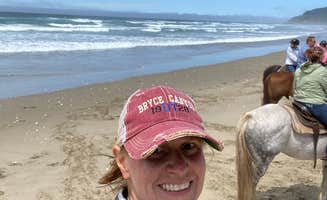Equestrian camping enthusiasts flock to the Coos Bay region where thick coastal forests meet expansive beach riding opportunities. The area's moderate coastal climate, with average summer temperatures around 65°F and winter lows rarely dropping below 40°F, provides year-round riding conditions. Horse campgrounds near Coos Bay offer trail access to both forest paths and beach riding, with several facilities specifically designed to accommodate large animals and their trailers.
What to do
Trail riding to beaches: At Bullards Beach State Park Campground, equestrians can access beach riding about 1.5 miles from camp. "Beach is about 1 mile walk from campground. Lighthouse is about 3 miles from campground," notes Rachel G., highlighting the riding distances to key landmarks.
Lighthouse tours: The historic lighthouse near Cape Blanco State Park Campground provides a scenic destination for riders. "You can walk to the lighthouse and the beach from the campground," according to Mea H., making it accessible for both riders and hikers.
Forest trail exploration: The dense coastal forests offer shaded riding opportunities. "It's a nice size to get to know a few neighbors - but not too many. I didn't have a horse to hop on, but I did notice a great mix of scenery to explore," reports Bjorn S. about Wild Mare Horse Campground.
What campers like
Privacy between sites: Many equestrian campers appreciate the layout at coastal horse camps. "The campground is gorgeous! It's nestled among Sitka spruce trees. They provide a lot of privacy between you and your neighbors and are just so pretty," writes Mea H. about Cape Blanco State Park.
Dedicated facilities: Horse campers value specialized amenities. "This is a horse camp, for people who have horses, NOT a car camp. It's not fair that car campers are taking reservation spots away from horse campers," explains Shannon C., highlighting the importance of dedicated equestrian facilities at Wild Mare Horse Campground.
Coastal access: Direct beach riding is a major draw. "Baker Beach Campground has small (only a handful of sites) campground with a moderate walk to the beach," reports North Idaho N., adding that "The walk to the ocean was through soft/deep sand (watch out for horse manure as there are horse tours happening nearby)."
What you should know
Campground etiquette: Non-equestrian campers sometimes create challenges at horse-specific campgrounds. "We arrived with our horses. And notice cars and camper are allowed to camp. Not a good mixture. Fire work going off all through the weekend and gun shots noticed the next morning," warns Laurie S. about Wild Mare Horse Camp.
Beach access considerations: Reaching beaches often requires navigating dunes. "Be prepared for a hike through deep shifting sand dunes to get to the beach. And watch out for horse poo as this is a busy horse path the local stable takes to the beach," advises Annie C. about Baker Beach Campground.
Varying facility quality: Amenities differ significantly between campgrounds. "A pro is they have free showers but the con is it's a cold experience. If more than one shower is in use at a time the water is barely warm," reports Mea H. about Cape Blanco, while other horse camps like Dry Lake offer more primitive accommodations.
Tips for camping with families
Beach activities: Families appreciate the coastal access. "This is a little hidden gem as it is not well marked on maps or along highway 101. There are only about 5 campsites...


